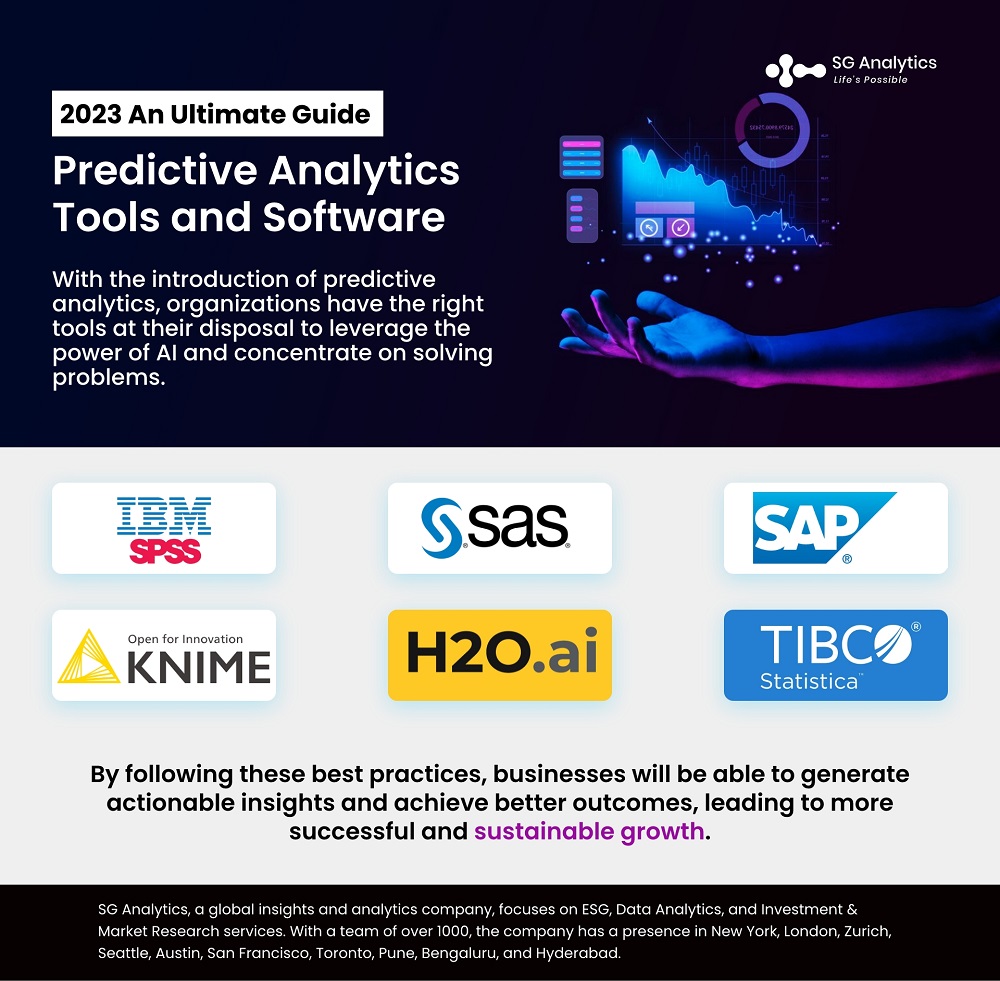With heaps of data at an organization's disposal, it is becoming more vital than ever to leverage data for better business decisions. It is also being used to run better marketing campaigns, detect fraud early, and identify health problems early. And these are just some of the numerous use cases.
To put it simply, predictive analytics enables businesses to answer the question, “What is likely to happen next?” Predictive analytics uses data, statistical algorithms, and machine learning techniques to leverage historical as well as current data for predicting future events.
Predictive Analytics Tools - Introduction
AI-generated images are the talk of the town. These new tools can either be considered the heralds of the future or harbingers of professional doom. But while the market is discussing the ramifications of machine learning, it is also being trained in how to make decisions through predictive analytics tools. Assistance in predicting and responding to risks along with opportunities is emerging as a major market advantage.
Predictive analytics tools help in forecasting future business outcomes while preparing them for the storms ahead. As businesses seek to make data-driven business decisions, the use of predictive analytics tools and software is becoming increasingly important to leverage data to identify trends and predict future outcomes.
The rise in popularity and success of predictive analytics is coinciding with the growth of big data systems, enabling organizations to allow for diverse data sets to be analyzed for gaining predictive insights. This has further empowered them with advancements in machine learning, thereby expanding the range and accuracy of predictive analytics.
Read more: List of Top 10 Best Data Visualization Tools
What is Predictive Analytics?
Predictive analytics focuses on presenting insights generated from statistical modeling and machine learning techniques. This helps in identifying future outcomes based on present and historical data.
The tools help determine the patterns that are likely to re-emerge, enabling businesses to make informed and data-driven decisions about deploying their resources. Predictive data analytics has widespread applications across innumerable industries. It helps maximize profits by taking advantage of probable upcoming opportunities and minimizes losses by disinvesting in situations that predictive analytics deem risky.

Different predictive analytics tools are available, and choosing the right one can be daunting. These tools vary across several factors, such as function, usage, and number of users. For a product or tool to qualify for inclusion in the predictive analytics category, it must:
-
analyze structured and unstructured data
-
create datasets or data visualizations from compiled data
-
create predictive models to identify future probabilities
-
adapt to change
-
allow import and export from other data-collecting channels
Predictive Analytics Tools - Importance and Benefits
Predictive analytics assists organizations in monitoring their data systems and actively detecting trends for decision-making. It is used to get forecasts and gain additional insight. The rise in wide adoption of predictive analytics across industries, including finance, healthcare, transportation, and the manufacturing & automation industry, is the clearest indicator of its benefits. Some of the benefits of predictive analytics are as follows:
-
Better decision-making: Predictive analytics helps businesses to make data-driven decisions based on insights generated from large and complex datasets. This helps in identifying trends and relationships that would otherwise be difficult to discern.
-
Increased productivity and efficiency: Predictive analytics help organizations in optimizing their operations by determining areas for improvement. This also helps in reducing costs and increasing productivity, enabling businesses to operate more efficiently and effectively.
-
Better risk management: Predictive analytics help businesses identify and manage risks by analyzing data and predicting outcomes. This helps in making informed decisions about risk management and reduces the likelihood of costly mistakes.
-
Enhanced customer experience: Predictive analytics help businesses personalize their interactions with their customers by predicting their preferences and behavior. This helps in delivering more targeted marketing and customer service, thus enhancing the overall customer experience.
-
Gaining a competitive advantage: By leveraging predictive analytics, businesses can achieve a competitive advantage to stay ahead of trends and make informed decisions based on data-driven insights.
Read more: How is Data Analytics Transforming FinTech?

Predictive Analytics Tools for 2024
Traditionally, predictive analytics was perceived as a complex process that involved different steps to gather and process data, generate visualizations, and experiment with different theories to find a framework that adds real value. A dedicated team of data scientists and business stakeholders worked for long periods to
But today, with the introduction of predictive analytics models, organizations have the right tools at their disposal that enable them to leverage the power of AI and concentrate on solving problems. The predictive analytics space is no longer a strange entity for businesses. Some of the popular names in this space are listed below.
Let's explore and evaluate some of the best predictive analytics tools in the market that will perfectly fit your organization’s needs!
-
IBM SPSS Statistics: Best For Dashboard Capabilities
IBM SPSS Statistics is a famous predictive analytics tool offering a user-friendly interface and a strong set of features, including the SPSS modeler that provides users with advanced statistical procedures. It helps in ensuring precision and provides positive decision-making. Data preparation and management to analyze and report features are also included.
Key Features:
-
The tool has linear elastic net regression. This helps in estimating the linear regression models with one or more variables.
-
The tool offers customization for customer data sets.
-
Approximation of sampling distributions by resampling the initial data set.
Pros:
-
Offers easy statistical analysis for large data.
-
Helps in improving efficiency with coding.
-
Interactive dashboard.
Cons:
-
Expensive software.
-
SAS Advanced Analytics: Best For Variety
SAS is a leading tool across various analytics markets. The tool offers a long list of different predictive analytics and other advanced analytics solutions. With many different tools available, chances are good that SAS is exactly what an organization requires.
Features:
-
Quality-tested algorithms: The tool reflects the latest statistical methodologies to analyze and predict the future.
-
Diverse areas of operation with one environment: The tool provides analysis of variance, regression, categorical data analysis, survival analysis, cluster analysis, mixed-models analysis, nonparametric analysis, and survey data analysis.
-
Customization: The user can create task-specific graphics for effective interpretation and communication.
Pros:
-
Great for data exploration.
-
It is capable of processing large data sets.
-
Develop ML algorithms.
Cons:
-
It has a difficult learning process.

-
SAP Predictive Analytics: Best For ERP Data
If an organization uses its predictive analytics solution to analyze data in SAP software or the SAP Analytics Cloud, like ERP data, SAP Predictive Analytics is a good fit. It also has a few different options available when it comes to features. The tool allows the user to create, operationalize, and monitor predictive models. It also has advanced machine learning and security features.
Features:
-
Rapid insight: The tool helps in creating insights with different variables.
-
Discovering hidden insights: The tool helps in building predictive models and discovering hidden relationships in the data to make predictions about future events.
-
Automated analytics: The tool enables data scientists to focus on the work they need.
Pros:
-
Great integration with SAP Lumira.
-
Different databases can be connected.
Cons:
-
Complicated for beginners.
Read more: Taylor Swift’s Eras Tour: How has it Boosted the US Economy?
-
KNIME Analytics Platform
KNIME is a free and open-source platform that integrates machine learning and data mining components. This platform is the easiest to use. It can be used to design and execute great workflows. Furthermore, KNIME authorizes users to optimize and validate their models with the help of visual charts and summaries.
Pros:
-
The tool allows easy integration with other open-source software.
-
It allows users to isolate and fix workflow steps easily.
Cons:
-
Cumbersome UI
-
Slow loading time
-
Has poor visualizations

-
H2O: Best For Data Science Professionals
If an organization is exploring open-source predictive analytics tools with data mining features, then H2O can be placed at the top of the list. The tool offers fast performance, affordability, and advanced capabilities. The dashboard offers a veritable array of actionable insights.
Features:
-
Automatic scoring pipelines: H2O’s AI offers scoring pipelines that can be deployed to production.
-
Automatic feature engineering: The tool helps with the problem of feature creation by building new features from a data set.
-
The flexibility of data and deployment on how and where the company’s applications run.
Pros:
-
Great analytical and prediction tool.
-
Open source tool.
Cons:
-
Needs containerization facilities.
-
TIBCO Statistica
A data science and machine learning platform, TIBCO Statistica is paving the way to making data science accessible to everyone. The tool offers an easy click-and-go learning curve. It prioritizes usability and collaboration, thus enabling multiple people to work on the same project and facilitating the sharing of relevant data.
This software can handle large datasets collected from multiple data sources. The software also offers an extensive range of statistical methods and an easy-to-navigate interface, enabling users to rapidly create statistical and machine-learning models with built-in algorithms.
Features:
-
Faster insights: The tool helps in finding and accessing the information needed to pull the most relevant insights quickly.
-
Streamlined data access: An organization can access all of its data from an environment and prepare them for analytics.
-
Faster data prep: The tool preps and combines data at a faster pace by using enhanced joins and gaining performance improvements for data sources.
Pros:
-
The software provides reliable results.
-
The point-and-click process is helpful for neural networks.
Cons:
-
Default analytic models are difficult to work with.
Read more: Exploring the Latest Data Analytics Trends: Industry Insights

The Power of Predictive Analytics Tools - Summary
Predictive analytics is a powerful tool for organizations exploring ways to make data-driven decisions, enhance efficiency and productivity, and improve the customer experience. By employing advanced statistical techniques and machine learning algorithms, organizations can analyze complex datasets and gain insights into trends, patterns, and relationships. This can further lead them to generate more accurate predictions about future outcomes and better decision-making.
Predictive analytics models are used to avert cyberattack risks, manage resources, organize data, and find the best solutions possible. While many tools can be helpful for predictive analytics, an organization must conduct thorough research and consider different variables to make the best choice.
To make the most of predictive analytics, it is critical for businesses to start with clear business goals, collect high-quality data, employ appropriate tools and techniques, involve experts in the process, and refine the analysis over time. By following these best practices, businesses will be able to generate actionable insights and achieve better outcomes, leading to more successful and sustainable growth.
SG Analytics, recognized by the Financial Times as one of APAC's fastest-growing firms, is a prominent insights and analytics company specializing in data-centric research and contextual analytics. Operating globally across the US, UK, Poland, Switzerland, and India, we expertly guide data from inception to transform it into invaluable insights using our knowledge-driven ecosystem, results-focused solutions, and advanced technology platform. Our distinguished clientele, including Fortune 500 giants, attests to our mastery of harnessing data with purpose, merging content and context to overcome business challenges. With our Brand Promise of "Life's Possible," we consistently deliver enduring value, ensuring the utmost client delight.
A leading enterprise in Data Analytics, SG Analytics focuses on leveraging data management, analytics, and data science to help businesses across industries discover new insights and craft tailored growth strategies. Contact us today to make critical data-driven decisions, prompting accelerated business expansion and breakthrough performance.
FAQs about Predictive Analytics Tools
-
What is predictive analytics, and how does it benefit businesses?
Predictive analytics helps in identifying customers who are at risk of discontinuing their relationship with a business. By analyzing customer data along with behavior patterns, predictive models can be used to identify early warning signs of potential churn, enabling organizations to take proactive measures.

-
How do I choose the right predictive analytics tool for my business needs?
To ensure that you have the right predictive analytics tool for your needs, it is critical to search for the following features:
-
data integration - that facilitates the user to import and combine data from various sources and formats;
-
data analysis - that enables the conducting of descriptive and prescriptive analyses
-
data visualization - that helps in creating and customizing charts, dashboards, and reports
-
and data automation - to automate and streamline data workflows and processes.
-
Are there any open-source predictive analytics tools worth considering?
H2O is a widely used open-source machine learning platform and one of the best predictive analytics tools available in the market.
-
What are the common challenges in implementing predictive analytics, and how can they be addressed?
The problem is that predictive analytics tools deliver insights but fail to let users take action. Some of the common challenges in implementing predictive analytics are as follows:
-
Finding the right expertise
-
Collecting the right data
-
Developing a precise strategy
-
Developing a workable budget
-
Discovering a user-friendly solution
About SG Analytics
SG Analytics is an industry-leading global insights and analytics firm providing data-centric research and contextual analytics services to its clients, including Fortune 500 companies, across BFSI, Technology, Media and entertainment, and Healthcare sectors. Established in 2007, SG Analytics is a Great Place to Work® (GPTW) certified company and has a team of over 1100 employees and a presence across the U.S.A., the U.K., Switzerland, Canada, and India.
Apart from being recognized by reputed firms such as Analytics India Magazine, Everest Group, and ISG, SG Analytics has been recently awarded as the top ESG consultancy of the year 2022 and Idea Awards 2023 by Entrepreneur India in the “Best Use of Data” category.









